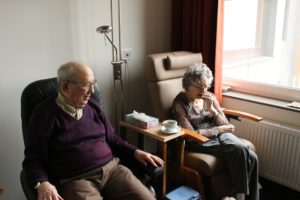Honoring Elderly Loved Ones: Upholding Dignity as Health Diminishes
Author: Christina M.H. PowellToday people are living longer and staying healthier longer. In addition, people experience more opportunities for social and geographic mobility. These positive developments can create challenges for elder care.

Consider Nancy. She is an independent 83-year-old with two children who moved away to different cities after college to launch their careers. Recently, Nancy experienced hearing loss that makes it difficult to understand instructions from her doctor. She also is having trouble moving around as freely as she once did and could use help shopping for groceries and taking care of basic chores at home. Her children worry about whether she is safe living alone.
Charles, an 88-year-old resident in an assisted living facility, faces more serious medical challenges. He survived a bout with cancer in his late 60s, and then enjoyed relatively good health until having a stroke six months ago. His daughter is concerned her father may need a higher level of care than he currently receives, but she is reluctant to relocate him to a nursing home.
Pastors minister to people like Nancy and Charles and their families on a regular basis in Sunday services, through counseling, or during visits to residential facilities. Elderly individuals need to process the emotional and spiritual aspects of the losses that come with diminished health. Their families need support as they make difficult caregiving decisions. Let’s consider the ethical issues related to aging and the best ways to minister to people at this life stage.
BIBLICAL PERSPECTIVE ON AGING
The Bible offers hope for fulfillment in old age, as well as guidance on creating caring relationships between generations. While our culture may focus on the contributions the young make to society, these words from the Psalmist promise productivity into old age: “The righteous will flourish like a palm tree, they will grow like a cedar of Lebanon; planted in the house of the LORD, they will flourish in the courts of our God. They will still bear fruit in old age, they will stay fresh and green” (Psalm 92:12–14).
Even when physical health begins to fail, the elderly can make important spiritual contributions through prayer and passing on a lifetime of wisdom to younger generations.
Perhaps more than any other season of life, old age is a time for focusing on relationships. “Children’s children are a crown to the aged, and parents are the pride of their children” (Proverbs 17:6).
Being around family members, especially grandchildren, is a joy for the elderly, reminding them that their legacy will live on even as their time on Earth draws to a close. While diminishing health can reverse the parent-child relationship, putting children in the role of caregivers, the final years of a parent’s life bring opportunities for deepening relationships and reconciling previous hurts and misunderstandings.
The command found in Deuteronomy 5:16 sets the tone for the relationship between adult children and their parents: “Honor your father and your mother, as the Lord your God has commanded you, so that you may live long and that it may go well with you in the land the Lord your God is giving you.”
Stretched beyond their context, these words can become a source of guilt for children making difficult caregiving decisions. Ideally, there is great benefit when the generations can live close to one another. However, in certain circumstances, for the sake of the safety of the elderly and to balance the needs of all family members, professional caregivers may need to supplement the role of caregiving within the family structure.

ETHICAL ISSUES IN LONG-TERM CARE
Caregiving options for elderly individuals have increased in response to the needs of people who are living longer and experiencing more social isolation from loved ones. Someone like Nancy could hire a home care helper to shop for groceries, run errands, and complete chores. Perhaps a friend from church could accompany her on visits to the doctor to make sure hearing loss does not interfere with the communication of medical information.
Nancy also might want to consider independent senior living or perhaps assisted living if her medical needs increase. Continuing care communities, while often expensive, offer different levels of assistance within the same community. If the need for skilled nursing care arises, as it has for Charles, a resident will experience less disruption in his life than a person needing to move to a new community as health diminishes.
The ethical principle in choosing care for an elderly loved one is to pick the least restrictive setting possible that also provides the right level of safety and care. On the least restrictive end of the spectrum of choices is the person’s own home, supplemented with outside nursing care or home care help. A skilled nursing home is generally the most restrictive choice, but it provides the highest degree of safety and medical care. Families should consider how a loved one’s needs might change in the future, making a choice that does not hamper independence now, but provides for an easy transition as medical needs increase. Financial realities underscore the importance of not selecting an option that provides more services than needed.
The onset of dementia or the aftermath of a stroke may prompt a caregiver to move a spouse, parent, or elderly loved one from a home filled with a lifetime of memories. Anger and resistance from the ailing family member often compounds the turmoil associated with this difficult decision. Pastoral care can help ease this transition for the patient and family members. Pastoral staff visits in the new location may assure the patient that changing circumstances will not cause people to forget him or her. Pastoral counseling may help the caregiver make wise decisions and process feelings of guilt. After the transition period, the quality of life for patients often increases, and their families have more peace of mind knowing that their loved ones are safe.
In caring for elderly patients such as Nancy, doctors and family members must be careful to remember that a patient retains rights to privacy, to give informed consent for medical procedures, to refuse treatment, to review medical records, and to prepare advanced directives, such as a living will, durable power of attorney, and a Do Not Resuscitate (DNR) order. No one should mistake physical disabilities, such as hearing loss, for the inability to make treatment decisions.
Pastors can encourage families to have the difficult conversations when an elderly loved one is in relatively good health. This is the best time for family members to prepare legal documents so there is no room for misunderstandings when the time comes for making tough decisions. Selecting the right long-term care options and preparing for end-of-life issues are practical ways children can honor their parents and uphold their dignity, expressing gratitude for the ones who gave them life many decades ago.
